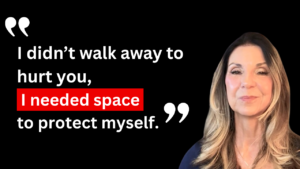Being kept from your grandchildren is one of the most heartbreaking experiences a grandparent can face. The joy and connection you feel with your grandchildren are irreplaceable, and when conflicts with in-laws or your adult children lead to estrangement, it can be devastating. Understanding the reasons behind the estrangement is vital in mending the relationship and reestablishing those precious bonds.
Understanding Why
One term that captures this painful situation is the “weaponizing of grandchildren,” as described by Dr. Joshua Coleman. This refers to when grandchildren are used as leverage in adult conflicts, often to exert control, punish, or manipulate grandparents. This tactic usually arises from deeper issues within adult relationships, such as unresolved conflicts, perceived threats to family dynamics, or differing values and parenting styles. It’s essential to recognize that these issues often stem from the relationship between the adult child and the parent rather than any direct behavior toward the grandchildren.
Generational changes in the roles and authority of grandparents also contribute to estrangement risks. In the past, grandparents often held more authority and were deeply involved in family decisions. Today, dynamics have shifted, and grandparents might find themselves navigating new boundaries and expectations. Understanding these shifts can provide insight into the root causes of conflicts and help guide efforts to repair relationships.
Conflicts and Communication Breakdown
Differing parenting styles, values, and cultural norms are familiar sources of conflict between grandparents and their adult children or in-laws. For example, grandparents might have more traditional views on child-rearing, while the parents prefer modern approaches. These differences can lead to misunderstandings and tensions, especially if communication breaks down.
Effective communication is necessary when having these tough relationships.
Misunderstandings and miscommunications can quickly escalate into more significant conflicts, making estrangement more likely. By recognizing and addressing these communication issues, grandparents can begin to find common ground and work toward reconciliation.
5 Key Strategies
1. Understanding the Reasons Behind the Estrangement
Begin by reflecting on your behavior and actions. Consider whether there have been misunderstandings or unintentional offenses. Recognize that your adult child may be dealing with personal or emotional issues unrelated to you. Identifying these factors can open the door to reconciliation by showing empathy and understanding of their perspective.
Self-Reflection: Take time to assess your behavior and interactions honestly. Have you been critical or dismissive of your adult child’s parenting choices? Have there been instances where your actions might have been perceived as overstepping boundaries?
– Empathy: Put yourself in your adult child’s shoes. Understand the pressures and challenges they might be facing as parents. Sometimes, conflicts are not about specific issues but about underlying stress or insecurities.
-Open Dialogue: Have an open and non-confrontational conversation with your adult child about the estrangement. Express your feelings without blaming them, and listen to their side of the story without interrupting.
2. Initiate Communication with Sensitivity
Respecting your adult child’s boundaries is crucial when reaching out. Wait for an appropriate time and approach the conversation with sensitivity. If direct communication feels too challenging, consider using a mediator, such as a therapist, to facilitate the discussion. A neutral third party can help navigate the conversation and ensure both sides are heard.
– Timing: Choose a calm moment to initiate the conversation. Avoid bringing up sensitive topics during family gatherings or stressful times.
– Tone: Approach the conversation with a calm and non-judgmental tone. Avoid accusatory language and focus on expressing your desire to understand and heal the relationship.
– Professional Help: Sometimes, emotions can run too high for productive conversations. A family therapist or mediator can provide a safe space for both parties to express their feelings and work towards a resolution.
3. Address Underlying Issues
Acknowledging and apologizing for past mistakes can be a decisive step towards healing. If needed, seek therapy to work through underlying issues. Demonstrate a genuine willingness to address and resolve the problems that contributed to the estrangement. Starting the process with a heartfelt letter of amends can show your commitment to making things right.
– Apologies: I sincerely apologize for any actions or words that may have hurt your adult child. Acknowledge their feelings and validate their experiences.
– Therapy: If the conflicts are deeply rooted or complex, consider family therapy. A therapist can help uncover underlying issues and guide you through healing.
– Letter of Amends: Write a heartfelt letter to your adult child expressing your regret for past mistakes and your desire to rebuild the relationship. Be specific about what you are apologizing for and how you plan to make amends.
4. Respect Boundaries
Respecting your adult child’s wishes is crucial, especially if they are not ready to engage in a relationship. Maintain a connection through occasional notes or texts without pressuring them. Letting them know you are there and ready to reconnect when they are can keep the lines of communication open without overstepping boundaries.
–Boundaries: Understand and respect your adult child’s boundaries. If they need space, give it to them without taking it personally.
– Consistent Contact: Stay in touch through occasional messages or cards. Express your love and willingness to reconnect without making them feel pressured.
– Patience: Rebuilding trust and relationships takes time. Be patient and give your adult child the space they need to come around.
5. Be Prepared to Make Changes
Be willing to alter certain behaviors and modify your approach based on expressed concerns. Show your commitment to working towards a healthier relationship by actively listening and making the necessary changes. This might include adjusting your expectations, being more flexible, and demonstrating that you respect their parenting choices and boundaries.
– Behavioral Changes: Be open to feedback and willing to change behaviors that might have contributed to the conflict. This could mean being less critical, more supportive, or more respectful of their parenting choices.
– Flexibility: Be flexible in your expectations and approach. Understand that your role as a grandparent might need to adapt to fit the current family dynamics.
-Consistency: Through your actions, consistently demonstrate that you respect their boundaries and are committed to a positive relationship. Small, consistent changes can build trust over time.
Conclusion
Experiencing estrangement from your grandchildren is deeply distressing. However, understanding the reasons behind the estrangement, initiating sensitive communication, addressing underlying issues, respecting boundaries, and being prepared to make changes are key steps towards repairing the relationship. Healing and rebuilding bonds with your grandchildren require patience and persistence, but with these strategies, you can work towards overcoming the challenges and reestablishing those precious connections.
Reconnecting with your grandchildren and overcoming estrangement is a journey that involves empathy, understanding, and a willingness to adapt. By taking these steps, you can foster a healthier, more harmonious family dynamic and ensure that your grandchildren can enjoy the love and support only grandparents can provide.









